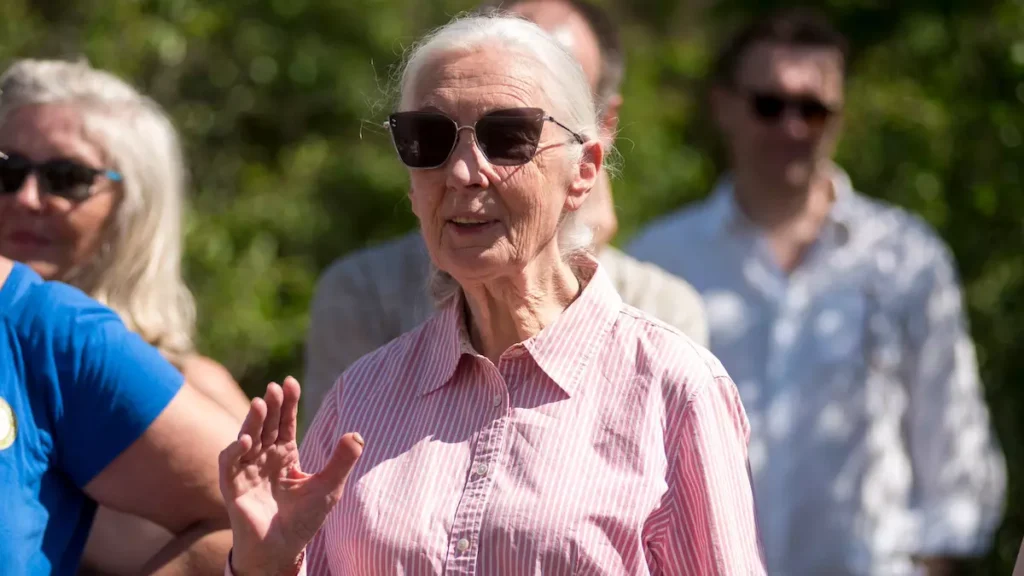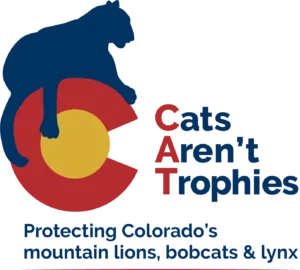Scientists say mountain lions self-regulate and benefit deer and elk by cleansing populations of Chronic Wasting Disease
Grand Lake, CO — Dr. Barry R. Noon, Ph.D., Professor Emeritus of the Department of Fish, Wildlife and Conservation Biology at Colorado State University and Dr. Fernando Nájera, DVM MS Ph.D., Director of California Carnivores Program at the Karen C. Drayer Wildlife Health Center of UC Davis School of Veterinary Medicine, are the two most recent leading wildlife science experts to join the legendary Dr. Jane Goodall, PhD, DBE in a public letter that states “Mountain lion trophy hunting is unnecessary to manage stable mountain lion populations.”
The letter is now signed by 22 scientists, including three former top scientists with the National Park Service; and an assembly of other reputed wildlife biologists with hands-on field work with mountain lions in the West.
The open letter is for Colorado voters set to decide Proposition 127, Cats Aren’t Trophies, in the coming weeks.
Interviews are available with independent scientists.
“Wild cats evolved in Colorado’s natural ecosystems and maintain stable populations based on territorialism, intraspecific aggression, prey availability, low reproductive rates and juvenile survivorship, and other key biological and ecological characteristics,” report professional working wildlife scientists in providing background as voters consider Proposition 127. Their resolute conclusion: trophy hunting is a form of trophy hunting, not management.
Dr. Jane Goodall joins a list of prominent experts in the field of mountain lion research, including Adrian Treves, PhD, of the Carnivore Coexistence Lab at the University of Wisconsin-Madison, and Dr. Rob Wielgus, former director of the Carnivore Conservation Lab of Washington State University. Dr. Wielgus did pioneering work to demonstrate that trophy hunting creates social chaos among surviving lions, with the scientists noting in their joint letter that “trophy hunting may also exacerbate human-lion conflicts by removing unoffending animals from the ecosystem, leaving the door open to younger cats who are more likely to be involved in conflict random recreational killing of lions.”
“These wild cat populations can and do regulate themselves, while providing a multitude of benefits to ecosystems,” commented Dr. Elaine Leslie, PhD, former chief of biological services for the National Park Service, who concludes that “the inhumane trapping and hunting of mountain lions and bobcats is not an ethical management tool.”

The authors note that mountain lions play a critical role in controlling ungulate populations, including deer and elk, which in turn helps combat the spread of Chronic Wasting Disease — an incurable disease that has infected 42 out of 51 deer herds and 17 of 42 elk herds in the state. The always-fatal infectious disease is viewed by a wide range of observers as the more serious long-term threat to deer and elk hunting in Colorado and other Western and Midwestern states and provinces.
The scientists, in practical terms, validated the recently issued report from former USDA researcher and infectious disease specialist Dr. Jim Keen, DVM, PhD, which documents with citations to the Colorado research literature that lions preferentially remove neurologically impaired lions from populations and cleanse the populations of Chronic Wasting Disease (CWD). Dr. Keen’s work reveals that lions are a bulwark against the spread of CWD, with high rates of infection in areas without lions and low or no incidence of CWD where lions survive. “With a prohibition on trophy hunting, mountain lions can provide maximum ecosystem services, like keeping elk and deer herds healthy,” wrote the impressive list of wildlife biologists, ecologists and research scientists, who also specialize in lion science.
The signatories urge voters to consider the scientific evidence in favor of a “YES” vote for Proposition 127. The state begins mailing ballots to registered voters on Oct. 11.
“These magnificent animals are sentient beings and like us can feel happy, sad, nervous and fearful. This means they can suffer mentally as well as physically. They are not out there to be shot for trophies or to make money,” stated Dr. Jane Goodall, PhD, DBE, UN Messenger of Peace.
20 Professional Wildlife Biologists, Ecologists and Working Wildlife Research Scientists, Including Specialized Experts on Mountain Lion Science, on this letter include:
Collette Atkins, M.S., Marc Bekoff, Ph.D.., Mary Foley, Ph.D., Dr. Jane Goodall, Ph.D., DBE, Rick Hopkins, Ph.D., David Jennings, Ph.D., Fred Koontz, Ph.D., Elaine Leslie, Ph.D., Kent Livezey, M.S., Michelle Lute, Ph.D., Delia Malone, Ph.D., Erik Molver, M.S., Carter Niemeyer, M.S., Michael Pardo, Ph.D., Joshua Rosenau, M.S., Francisco J. Santiago-Ávila, MPP/MEM, Ph.D., Michael Soukup, Ph.D., Adrian Treves, Ph.D., T. Winston Vickers, DVM, MPVM, Robert Wielgus, Ph.D., Barry Noon, Ph.D., Fernando Nájera, Ph.D.

